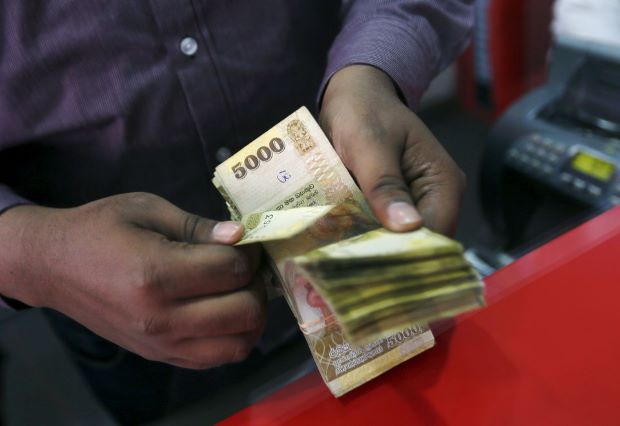Sri Lanka exporters protest rupee appreciation, forced conversion rules
COLOMBO – Sri Lanka’s export associations have protested the recent sharp appreciation of the rupee saying, forced forex conversion rules have been forced on them and some costs are not falling in line with the rupee gains, leading to a loss of cost competitiveness.
Sri Lanka’s central bank is operating a de facto pegged exchange rate where the agency’s domestic assets are being reduced against dollar purchases (reversing ‘money printing’), triggering a balance of payments surplus allowing the exchange rate to be appreciated if the agency wishes, analysts have shown.
There is however a widespread belief that suspending debt repayments has helped appreciate the rupee, though the financial account turned into a deficit in the last quarter of 2022, just as monetary stability was restored allowing out payments to be made and reserves to be collected.
In the five quarters ending December 2023, the financial account was 1.35 billion dollars in deficit, before adjusting for errors and omissions, official data show.
Currency depreciation helps widen exporter margins in countries with monetary instability as there is a delay in wages catching up, triggering social unrest and outmigration and – if energy and water are not market-priced regularly – through losses in state utilities.
But if wages are raised and any domestically purchased inputs, including items like domestic transport that do not immediately fall with rupee appreciation, can squeeze exporter margins.
The central bank had allowed the rupee to appreciate from 360 to the US dollar to 300 now, after a surrender rule imposed on commercial banks to force sell dollars to the central bank against new rupees while taking dollars out of the interbank forex market was lifted in March 2023.
However, a surrender rule imposed on exporters to sell to banks by macro-economists in the central bank (which does not create new rupees nor take money away dollars from the forex market), remains in place, constrains their ability to delay or sell dollars as they wish at the best price.
The Exporters Association of Sri Lanka, the Joint Apparel Association Forum of Sri Lanka, the National Chamber of Exporters, the Tea Exporters Association, Sri Lanka Association of Manufacturers and Exporters of Rubber Products.
Tea exporters who buy at an auction in rupees are also squeezed, if the rupee appreciates between the time materials are bought and tea is blended and packaged and finally shipped, unless all dollars are sold forward when the currency appreciates.
The central bank had earlier denied a request to conduct auctions in US dollars, using a money monopoly given to economic bureaucrats by legislators.
The central bank had also blocked the exporters’ dollars from being moved from bank to bank.
“Today, we stand united in urging the authorities to address the pressing challenges posed by the appreciation of the Sri Lankan Rupee (LKR) against the US Dollar (USD), further compounded by restrictions on the movement of foreign currency between commercial banks, and the mandatory conversion of export earnings into Sri Lankan Rupees,” the exporter associations said.
The association said the exchange rate which peaked at over 364 per USD in May 2022, led to increased operational costs, compelling them to adjust their cost base in line with higher inflation experienced in the country.
“The rapid appreciation of the Rupee, with rates falling below Rs. 300 per USD since March 19th, has placed us in a precarious position, threatening the sustainability of our businesses and the livelihoods of those we employ,” the statement said.
“Despite the appreciation of the Rupee, the cost of living remains high, continuing to level pressure on worker wages.”
The exporters did not say by which percentage wages were raised, but analysts say progressive income taxes imposed by the International Monetary Fund as part of ‘revenue-based fiscal consolidation’ where government cost-cutting is abandoned, also force exporters to raise salaries beyond rupee depreciation to maintain staff living standards.
“It is crucial to recognize that the landscape of our foreign exchange reserves has significantly transformed and the continued enforcement of the mandatory conversion policy, considering the current positive reserves, is counterproductive,” the exporters said.
“Persisting with this approach has placed exporters at a market disadvantage and forced them to operate on an unlevelled playing field, eroding their competitiveness.
“It further acts as and is viewed as an anti-export policy measure.”
-economynext.com



Comments are closed, but trackbacks and pingbacks are open.